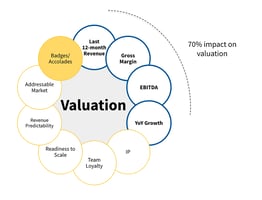Raising The Flag On Iwo Jima, Courtesy The Associated Press We've talked about implementing OKRs...
Understanding Business Value Of Your Tech Services Firm
At Vixul, we emphasize the importance of focusing on the value you provide to the customer. This enables you to price yourself in terms of value delivered at higher margins rather than a cost-plus-margin model. It also enables them to improve their close rate by instilling confidence they understand the business needs and up-level the conversation with their clients. In this article, we explore the business value that tech services companies bring to their clients and the industry to enable founders of tech services companies to better understand and relate their value to clients.

The Business Value Of Technology
Before we discuss the value a tech services company provides, we want to take a moment to consider the value of technology to a business. Ultimately, business value translates into making more money or saving money. This value typically falls into the following categories:
Unlock Revenue
The most obvious way to unlock revenue is through software development by creating new products and features. This can also include integrations with new systems, meeting compliance requirements, deploying to new environments that open up new customer opportunities, and providing better insights to customers through data. Unlocking revenue is the most valuable service a tech services provider can offer. Even work generally considered unrelated to revenue, like security and DevOps, can be about unlocking revenue for many customers.
Reduce Time To Market
Reducing time to market is often a core reason for bringing in tech services companies—to implement a solution faster than an internal team can. Additionally, much technology is implemented to make development teams more effective. At our previous company, our UVP was making development teams more productive. It’s not just DevOps work that reduces time to market; many teams excel in specific types of problems and are called in during emergencies. Reducing time to market is a special case of unlocking revenue but can also be about maintaining a competitive edge.
Reduce Costs
While reducing costs may be less exciting than unlocking revenue, it is far easier to measure directly. Being able to articulate value with clear numbers is extremely valuable. However, cost reduction comes with a ceiling on what a client is willing to pay. As the costs saved are calculated, clients weigh the risks of achieving these goals, the additional overhead involved, and the diminishing value, which ultimately lowers their willingness to pay.
Reduce Risks
This is a specific form of cost reduction, but instead of predefined costs, it’s about reducing the risk of something going wrong, which makes the value less clear-cut. Most security work falls into this category. If you’re in the business of reducing risks, you’ll need to educate your clients and help them balance these efforts with revenue-generating activities. A good focus is on enabling the client’s revenue generation teams to be more effective. Security teams, for example, often clash with development teams over requirements that slow development down. If security teams position themselves as partners to development, they can become much more effective.
Improve Customer Experience
Improving customer experience can be just as important as unlocking new revenue opportunities. This includes areas like uptime, user experience, and speed. While these metrics are often measurable, clients usually require more education on their business value. However, specific areas—such as improving conversion rates—can be directly tied to business outcomes.
Your Market Position
There are two main ways to position your company to customers: as a specialist or a boutique. We recommend reading the article “What Professional Services Firms Must Do To Thrive” to understand the compromises. We also recommend becoming an expert in a problem advising on what needs to be done while also solving the problem. The kind of company you choose to be changes the value you provide. While the technology you create provides one form of value, the value your services firm offers is different—it’s about why clients will choose you over an internal team.
Flexibility
A key value every consulting company provides is flexibility. Rather than having to build expertise internally and hire full-time employees (FTEs), clients can quickly ramp up a team with your services. They don’t have to worry about reassigning or laying off employees if their needs change.
Cost
Consulting companies can also help clients reduce costs by leveraging offshore talent or proprietary processes. Consultants may have intellectual property (IP) that allows them to operate more efficiently than clients could on their own. However, this is a low-margin business model where efficiency is key. In the HBR article, firms like this are referred to as "commodity" and "procedure" services firms.
Expertise
Ideally, clients want to work with you because they lack your internal capabilities. You enable them to do something they couldn’t do before, which makes your service much more valuable. This high-margin business model is focused on delivering the best customer outcomes. In the HBR article, this includes "gray-hair" and "rocket science" services firms.
Ease
As a consultant, you ease many burdens for your clients. This can include recruiting, managing, training, and HR responsibilities, depending on your offering. Always strive to make things easier for your clients, but be careful not to dilute your brand by prioritizing short-term client goals over long-term value.
Outsider Perspective
Being an outsider you may have some advantages that internal teams don’t have. Some of it may come from doing work that they want to protect their internal team from. Alternatively, as an outsider, you don’t have the same political history that internal teams have. You can represent yourself as a neutral stakeholder in conversations between teams that don’t agree with each other and broker agreements. While your position is less stable within the organization, you can leverage your weakness like a Shakespearean fool to speak truth to power.
What This Means For You
In this article, we've provided tools to help you understand the value your tech services provide to clients. It's important to ensure that you can clearly explain this value to your customers so they understand the needs you're addressing and have confidence in your ability to meet those needs. In addition to understanding the business needs you’re addressing, clients will always consider whether they could handle the work internally. To overcome this, you must articulate the unique advantages you offer over their internal teams. By positioning yourself as a partner that empowers the internal team, you can turn them into allies, making your collaboration more effective.
You’ll also need to make strategic decisions about the type of company you want to be, which is largely defined by your value discipline. Understanding these principles and making clear strategic choices will allow you to create a compelling unique value proposition (UVP) for your tech services firm.
A clear understanding of your UVP will be the foundation of your go-to-market strategy. This strategy will help you guide prospects through the stages of your marketing funnel, from awareness to conversion and loyalty. We’re also planning a webinar on identifying and fixing leaks in your marketing funnel. If you're interested in this event, subscribe to our mailing list to stay updated.


%20(10).png?width=960&height=540&name=Q423%20Blog%20images%20(1920x1080)%20(10).png)

